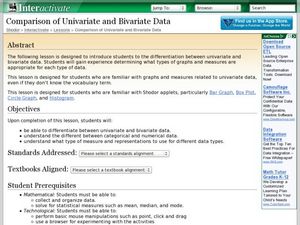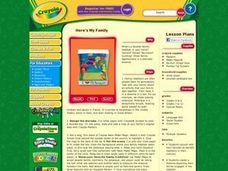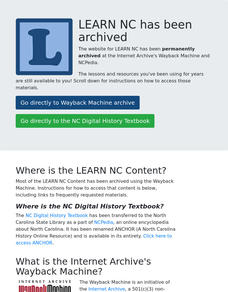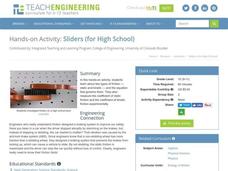Curated OER
Comparison of Univariate and Bivariate Data
Learners explore the concept of univariate and bivariate data. In this univaritate and bivariate data instructional activity, pupils discuss the differences between univariate and bivariate data. They work sample problems where they must...
Teach Engineering
Boxed In and Wrapped Up
If cubes have the smallest surface area, why aren't there more cube-shaped packages? Scholars take a box in the shape of a rectangular prism, cut it up, and make new boxes in the shape of cubes with the same volume. They then brainstorm...
Inside Mathematics
Archery
Put the better archer in a box. The performance task has pupils compare the performance of two archers using box-and-whisker plots. The resource includes sample responses that are useful in comparing individuals' work to others.
Canton Museum of Art
Personal Clay Box
High schoolers will love this geometrically exact ceramics project; they create a personalized clay box using the slab method and mathematical measurements. They utilize scoring and square construction and can decorate the boxes to...
Curated OER
Gift Box and Christmas Carols
In this holiday worksheet, students create a gift box by cutting, folding, and gluing a given pattern. Students also read lyrics and sing four Christmas carols.
Curated OER
New Boxes From Old
Students find the volume and surface area of a rectangular box (e.g., a cereal box), and then figure out how to convert that box into a new, cubical box having the same volume as the original. As they construct the new, cube-shaped box...
Curated OER
The Mystery Box
Students design a mystery box to hold an object related to the timeline of life studies. In this timeline of life lesson, student play a game with fossils and other remnants of past times and guess the era it comes from.
Curated OER
Here's My Family
Family traditions help to instill personal values, social norms, and the warmest of childhood memories. Elementary and secondary learners share their favorite family traditions with a fun diorama project. Using modeling clay, they create...
American Museum of Natural History
Create a Coral Reef
Scholars create a diorama to showcase a vibrant coral reef. Six steps walk pupils through setting up the diorama box, crafting four different types of marine life, and putting it all together.
Curated OER
Congruent Boxes
Students decorate the congruent faces and edges of boxes in exactly the same way. They teach the terms "congruent," "faces," and "edges" to their parents.
Beacon Press
A Time to Break Silence
Encourage teenagers to get involved in ending violence among young people. A Common Core-aligned resource and curriculum guide, designed to be used with a reading of A Time to Break Silence: The Essential Works...
EngageNY
Mid-Module Assessment Task - Algebra 1 (module 2)
A mid-module assessment uses two multi-part questions to measure progress toward mastery on descriptive statistics standards. Each part of a question addresses a single standard to help determine mastery.
Curated OER
Adding Two Numbers
Keep addition drills interesting by varying the exercises. There are four separate sections here for youngsters to solidify their understanding of adding three-digit addends. First, they calculate eight vertically aligned equations,...
Curated OER
Adding Decimals
Get your mathematicians ready to add up restaurant tabs using decimal addition problems. Using two examples to guide their processing, they find the sum of eight vertically aligned number pairs, all of which have decimals. They complete...
Curated OER
Dividing
If you're looking for some guided division drills for third and fourth graders, you've found it! There are examples here to guide learners as they divide two-digit numbers by one-digit numbers, many of which have a remainder. The first...
Shodor Education Foundation
Algorithm Discovery with Venn Diagrams
Here is a lesson plan that takes an interesting approach to analyzing data using box and whisker plots. By using an applet that dynamically generates Venn diagrams, the class forms a strategy/algorithm for guessing the rule that...
Curated OER
Dividing
Here's a set of division problems to drill your scholars; they complete 48 horizontally aligned equations total. These problems are separated into four sections of 12 equations each: learners divide by six, seven, eight, and nine. Many...
DK Publishing
Dividing and Finding Remainders, 2-digit Numbers
Vary the exercises to keep learners engaged in division drills. Here they complete three different sections to solidify this skill in distinct contexts. First, scholars solve 16 horizontally aligned equations, most of which have...
Teach Engineering
Floaters and Sinkers
Whatever floats your boat. Young engineers learn about density by measuring the masses and volumes of boxes filled with different materials. Using their knowledge of densities, they hypothesize whether objects with given densities will...
Curated OER
Addition Practice #1
Show young mathematicians that they are fully capable of mentally adding two-digit numbers. They start by solving 12 two-addend problems (all with two-digit numbers and aligned horizontally). There is no room to show work. Consider...
Shodor Education Foundation
Triangle Area
While the lesson plan focuses on right triangles, this activity offers a great way to practice the area of all triangles through an interactive webpage. The activity begins with the class taking a square paper and cutting in in half; can...
Virginia Department of Education
World History and Geography: 1500 A.D. (C.E.) to the Present
Intended to help Virginia teachers align their curriculum to the state's history and social science standards, this packet provides a wealth of materials for any social studies or science instructor. Loaded with plans,...
Teach Engineering
Sliders (for High School)
Slip sliding away. Groups investigates the two types of friction by running an experiment that allows them to calculate the coefficient of static friction and the coefficient of kinetic friction. The experiment uses a box, a...
American Statistical Association
How Fast Are You?
Quick! Snap up the lesson. Scholars first use an online app to collect data on reaction times by clicking a button when the color of a box changes. They then plot and analyze the data by considering measures of center, measures of...

























